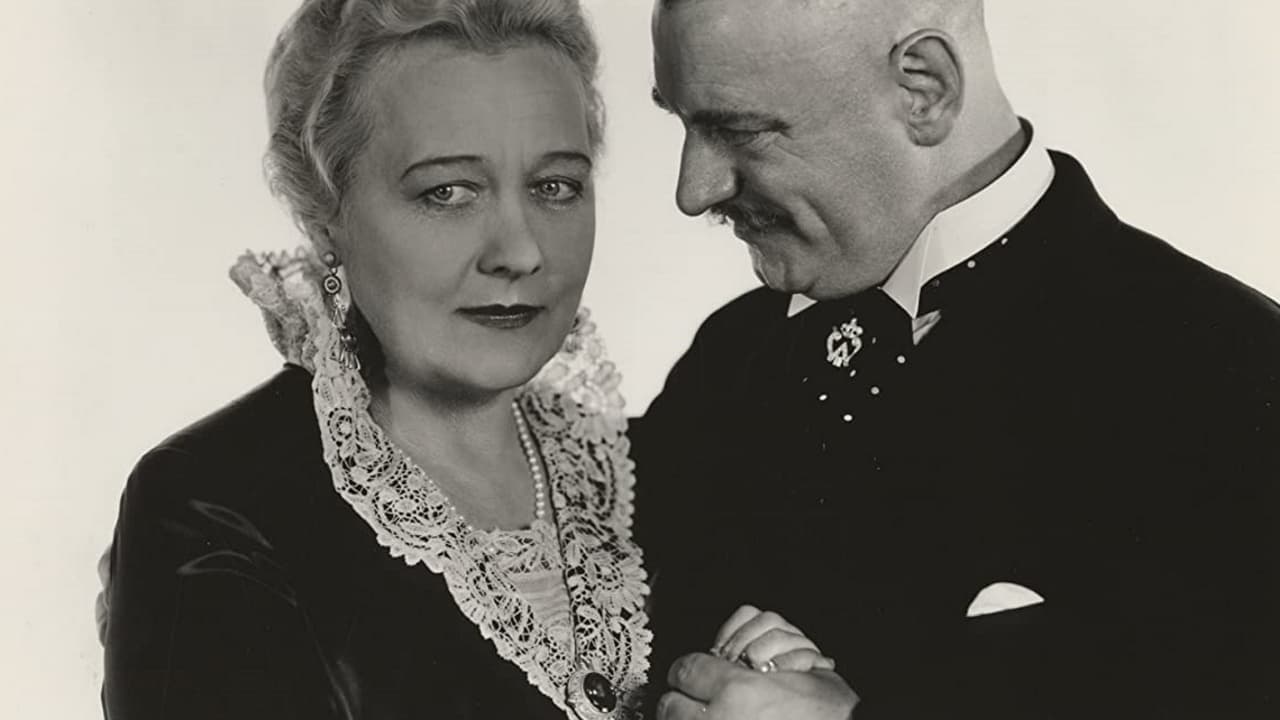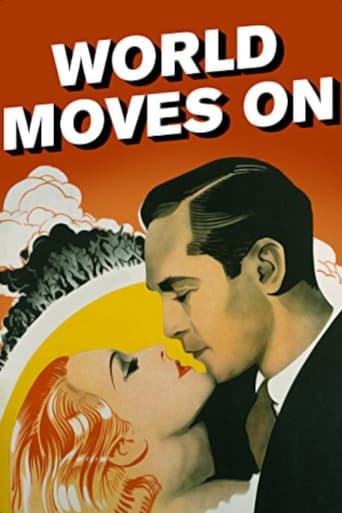

For a John Ford film this one is usually not mentioned in any retrospectives I know concerning his career. For a film that is internationalistic in scope it gets sadly neglected.Another reviewer compared The World Moves On to Cavalcade which came out a year earlier. For me this film most closely resembled The House Of Rothschild only instead of money the commodity is cotton and in the 19th century. In some places cotton was considered a kind of currency like in the American south. In 1825 the American family Girard merges with the British Warburtons and then has other sons settle in France and Germany just like Nathan Rothschild's kids as early proponents of globalism. After an 1825 prologue the action skips to 1914 where Sig Ruman of the German branch is hosting a big blowout with nary a thought to a possible war breaking out. War and the Roaring 20s type materialistic peace that followed are what is dealt with.By the way also watching this film I did wonder just how the combine managed to weather the American Civil War. But that was never mentioned.The film focuses on Franchot Tone of the American branch and Madeleine Carroll of the English Warburtons. They marry and she jilts Reginald Denny of the German branch in the process. Then Tone almost on a lark enlists in the French Army. The family with losses both financial and personal carries on though.Shoehorned into the film is Stepin Fetchit in a real travesty of a role. He's the family retainer as he usually is. Here he spots some French Senegalese African soldiers in dress uniforms and he thinks it's a lodge and wants to join. Of course he's eagerly recruited. Today's viewers might not realize but the popular Amos N' Andy radio show had their protagonists as members of the Mystic Knights Of The Sea Lodge. That reference to a lodge would not have been lost on a 1934 viewer. Stepin Fetchit's role adds zero to the story and it's more offensive than usual.Best part of The World Moves On are the battle scenes in World War I. They are not glamorized in any way, hardly like one of Ford's cavalry epics.I rate The World Moves On as low as I do because of Stepin Fetchit. Had he not been there this would far higher on John Ford's list of films for quality.
... View MoreUntil I actually watched it, I had never heard of "The World Goes On". The name of director John Ford was what called my attention, although I was already familiar with its stars, Madeleine Carroll and Franchot Tone, because I had watched both in 1935 films, respectively "The 39 Steps" and "Mutiny on the Bounty". The story is about two families that are partners in the cotton business. It all starts in 1825, when Richard Girard (Tone) becomes partner of Mary Warburton's (Carroll) husband, but falls for her. She comes back to England and never sees him again, but it comes that, 89 years later, their great-grandchildren, with their same names, get to know each other and fall in love. Mary leaves an almost-groom and marries Robert during the war, in which he participates as a soldier in France's Foreign Legion. What comes is the many changes the business faces during and after the war, with its owners, like Richard's cousins, each in one different country.Almost all the film is a regular historical drama, but near the end it becomes unforgettable, because it perfectly predicts World War II. Talking about a war after it happened is very easy, but mentioning it before it starts is the cleverest thing movies could have done. The sequence of images even shows some of the countries who were later involved in the conflict, like Germany, Italy, England and Japan. If WWII hasn't happened, this end would be a huge flaw and would be deleted in further releases. But it happened, and being able to foresee it in 1934 is, at least, amazing. Of course, no one can pass without noticing Dixie (Stepin Fetchit) and the horrible black stereotype. It was certainly a funny character in the 30s and it would also be today, considering his messes, if he wasn't shown as a feeble-minded. This is a sin not only John Ford committed in that time, but maybe we can forgive him of it and let ourselves be touched by the final image of this surprising film.
... View MoreAside from a couple of shots, it would be almost impossible to tell that John Ford directed this if you didn't see the credits. There is an astonishingly good combat sequence, but apparently most of this footage comes from a French film that Fox bought a few years before Ford made World in '34. Nonetheless, the combat stuff is breath-taking, and very well integrated with studio footage of the principals. Stepin Fetchit has some good lines. Some nice compositions show that Ford (or his cinematographer) wasn't totally disengaged. The multi-generational love story with its mystical overtones seems totally out of character for Ford, but the opening and closing shots of Christ on the cross remind us of Ford's lifelong religiosity.
... View MoreThis 1934 movie is largely unknown and considering it was directed by John Ford this may seem surprising .Yet even quite exhaustive surveys of his work either omit references to this movie entirely or else give it only a passing mention.Now that I have seen it I feel that this is not really surprising after all .It is bombastic ,muddled and confused ,with a -for me -unacceptable pacifistic line .It is the product of an isolationist mind set and I found it morally repugnant .Thankfully ,it is not very good and so it is possible to dislike it on artistic grounds as well.In form it is a family or dynastic saga ,split into a number of eras .It opens in 1825 in New Orleans as the family of a dead fabrics baron assemble for the reading of his will .The estate is split between branches of the family in the US -as represented by Franchot Tone -,England ,France and Germany .The rest of the action is this segment consists of Tone killing a ,man in a duel for insulting Madelaine Carroll.She and Tone have a mutual attraction but she is engaged to someone else and the affair is not consummated .The movie then moves forward to Europe immediately before World War 1 .The family gathers for a dynastic wedding .Tone and Carroll re-appear ,both playing descendants of the people they portrayed in the opening section of the movie.There are hints -conveyed by their response to a particular piece of music -that they have some kind of "deja vu" connected with their ancestors previous relationship but this potentially intriguing theme is never pursued .War breaks out and the family splits on national grounds .Tone joins the French Foreign Legion to take up arms against Germany but others respond in less sensible ways.Carroll defies the orders of the government and refuses to make munitions (an act of treason which bizarrely Ford seems to agree with)while a key member of the French side of the family joins the priesthood as a gesture against the war .The last part of the movie takes place in the 1920's .Tone is now a tycoon and an absolute megalomaniac driven by greed and a lust for power.The crash of 1929 sees him reappraise his life and values and take a "peace ,love and understanding ,man" approach to life .There are some good things about the picture .The scenes of wartime action ,without recourse to graphic violence ,do depict the horrors of war well but overall this is a sprawling mess of a movie .The episodic structure and the obvious striving after "significance "allied to a propensity to preach at the audience make it tedious .The last 10 minutes is essentially a lightly dramatised and sententious pacifist tract and as wishy washy as such farragoes of nonsense invariably are .One section is particularly offensive ,It involves newsreel footage of Hitler ,Mussolini and Japanese militarists and the British navy .Now ,Ford was an Anglophobic jerk (albeit one who could be a genius with the right story and actors at his disposal)but surely even a blinkered Irish nutter should have realised that to lump the British in with that bunch of lunatics was over-egging the pudding a tad .That decision was not the product of woolly thinking so much as feeble mindedness-the kind of oaf who thinks owning a U2 album makes them an expert on politics in general and "the troubles"in particular.No it doesn't -it makes you a musical illiterate easily parted from her/his cash by a bunch of pompous bores with guitars The acting is indifferent ,the racial stereotyping in the Stepin Fetchit role is insulting but above all I cannot tolerate a movie that responds to the rise of European and Asian dictators by advocating nonsense like appeasement and lionising treasonable factory ownersThis movie is pernicious tripe
... View More